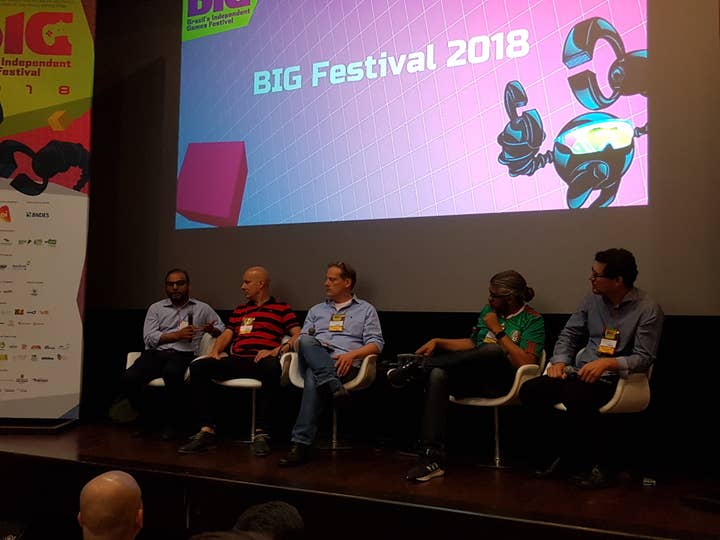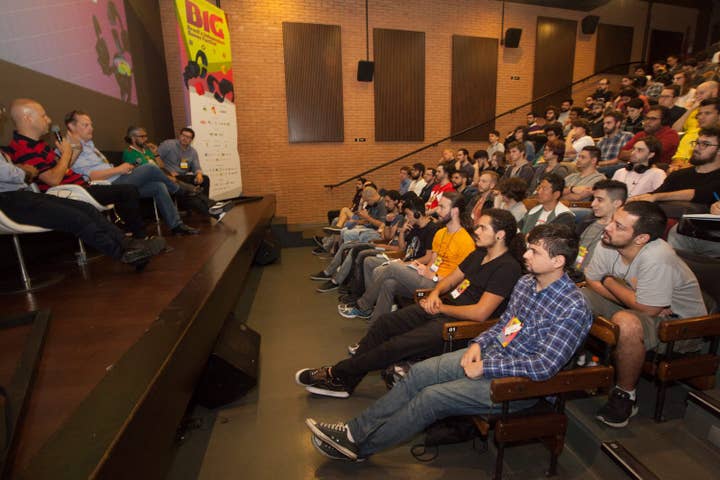"Real innovation is coming from emerging markets in many spaces - game development is one of them"
At the BIG Festival, a panel discussed the challenges facing studios in Latin America, and their hope for a brighter future
Building a stable career in the games industry is never easy. Independent developers face a wide variety of different challenges in simply getting a studio off the ground, let alone finding legitimate commercial success. For developers in emerging markets, though, the number of those challenges is even greater, their difficulty magnified by distance and cultural barriers.
At the BIG Festival in Sao Paulo last month, a panel of industry experts tried to offer practical advice to Brazilian developers on finding partners in the global industry. The abiding takeaway was that developers in Latin America right now should be prepared for a long and difficult road, beset by the same uncertainties that studios in more established industries face, with a handful of nebulous problems unique to those starting from further behind.
When asked which part of the games market a small studio in a country like Brazil should focus, the panel offered a predictably gloomy set of answers - focusing as much on what to avoid as what to pursue.
"Don't try to go head to head with Gardenscapes... Try and find a niche, and do it better than anyone else in that space"
Saad Khan
"If you're a small studio don't try to go head to head with Gardenscapes," said Saad Khan, Tilting Point's senior director of business development. "It's such a competitive marketplace that you can't scale a game if you're going against the top dog... Try and find a niche, and do it better than anyone else in that space."
Solid advice, if much easier said than done, and it was echoed by Michael Haberl, the founder of mobile game distributor Playades.
"Really find your niche, in terms of the games category," he said, adding that the app stores in the West are now too crowded for any other strategy to make sense on mobile. "You may have a lot more of a chance to make some local themed, cultural content for the Latin American market, the African market or [Asia-Pacific]."
That content shouldn't be for virtual or augmented reality, neither of which are stable enough to sustain an independent studio with limited resources - a description that could be applied to the vast majority of Brazilian developers, and those in most other emerging markets for that matter. For Haberl, focusing on VR or AR right now is, "the same as going into the casino and putting your coin on black or red. You don't know if it's going to work or not."
This is exactly why investors remain "extremely cautious" about VR in particular, said Pieter van der Pijl, managing partner at InFinCapital. "From an investor point-of-view the install base simply isn't there," he added. "If you're an investor you have certain returns to make for your fund to work, and in VR that's just too difficult, at least at the moment. It's the same thing with AR.
"You could build a VR game that looks absolutely magnificent, but as an investment it's probably not going to fly."

Mario Valle Reyes left EA after 11 years to co-found Altered Ventures, a VC fund with an emphasis on games made in emerging markets. At first, he said, the fund was going to be focused on VR and AR, but the near-term outlook for both markets seems less promising.
The same is true for mobile, he said, which he was highlighting as an opportunity for developers in emerging markets almost a decade ago.
"I stopped talking about the opportunity for emerging markets in mobile in 2016, because if you're trying to succeed in the mobile space only - good luck," he said. "It's much more difficult to succeed in that space if you don't have innovation, if you are not active in other categories like Instant Games. If you're trying to create a game like Angry Birds in 2018, again, good luck."
"Game developers do work for hire because they need to pay the bills, but it's a horrible business model in a way"
Pieter van der Pijl
The fact that mobile is crowded and VR has stalled are problems for developers in any country, but those in emerging markets like Latin America start at a disadvantage. Even if a Brazilian studio has a strong pitch for a PC or console game, there are few publishers located in the region, and international publishers are inundated with pitches from studios far closer to home.
"The most important problem that developers in emerging markets have is lack of cash," Reyes said, taking care to distinguish cash from "resources" - an ambiguous term that doesn't necessarily mean dollars and cents. And that need for cash - compounded by the difficulty of getting direct access to sympathetic publishers - often leads the region's developers to offer their services as work-for-hire studios. If a Brazilian developer's ideas aren't necessarily worth more than a developer in Europe or North America, their labour can be more cost-effective.
Saad admitted that all of Tilting Point's work-for-hire partners are located in regions that are considered to be emerging territories: Belarus, Romania, India.
"We're not looking for devs in the US and Western Europe any more for that same reason," he said. "The investment is much higher. At the end of the day, it's much less risk if you go for a lower cost."

However, while the arrangement yields benefits for a company like Tilting Point, the other panelists told the audience to be cautious.
"Game developers do work for hire because they need to pay the bills, and I completely get that," said van der Pijl. "But...it's a horrible business model in a way, because unless you have a really good organisation behind it, and you can ensure that there's sufficient work for the entire studio at all times, it's probably the worst business to be in."
InFinCapital is more active in Eastern Europe than in Latin America, van der Pijl said, but there are similarities in the skills and experience at most small studios: well trained coders, artists and developers are in abundance, but the way the studios are organised as businesses is, "really hit or miss." This is a bad mix in work-for-hire, actively standing in the way of accruing the money needed to work on original IP.
"What we see with a lot," he said. "You get 50-person studios working on AAA projects, the contract is done, they don't have work for one or two months, and all of the profit they made on that project is evaporated. They start to stress out, and they start taking on smaller bits and pieces here and there, and it goes from bad to worse.
"As emerging markets - as Latin America, as Brazil - we can do much more than low-cost development and work-for hire"
Mario Valle Reyes
"If you want to do work-for-hire you need to be really, really business savvy. In work-for-hire you have a few really large outfits that do well, a lot in the middle that are probably doing terrible, and a few smaller ones that do reasonably okay because they're small and cheap and flexible."
For Reyes, who pointed out that he was born in an emerging market, Mexico, the issue of work-for-hire is clearly more emotive.
"The reason I left EA after 11 years is because emerging markets are capable of going way beyond just being a great option for Tilting Point and other companies in terms of cost and talent," he said. "If you want to do work for hire, great. But if you are here to pitch your own babies, your own creations, then focus.
"Altered Ventures isn't the only one. The money is coming, the talent is coming, and as emerging markets - as Latin America, as Brazil - we can do much more than low-cost development and work-for hire."
For the attendees of the BIG Festival, the leading developer-focused event in Latin America, there is a good reason to be hopeful about the future. The very same factor that made countries in the region so attractive to international companies as a source of work-for-hire could lead to an explosion of new IP. In such a crowded and competitive market, the panellists agreed, every dollar counts.

"You do have an advantage in an emerging market, because usually you can produce games at a lower costs, which de-risks things for investors," van der Pijl said. "If this game needs X in marketing funding, that's the same as for a Finnish studio - there's no difference. But on the development side you do have an advantage. The amount of funding required for development is lower, but it is monetised in exactly the same way, so from an investment point of view you have an advantage.
"It is coming, and more and more investors and publishers are going to smaller, regional game shows in those countries. That's also our reason for coming here."
"I've been living in Silicon Valley for almost ten years, and Silicon Valley is, in many areas, over-valued"
Mario Valle Reyes
"Take a look at how many foreigners are at this event," Reyes added. "Take a look at it. This is happening in Dubai, this is happening in Mexico, this is happening in Indonesia. I've been living in Silicon Valley for almost ten years, and Silicon Valley is, in many areas, over-valued. Real innovation is coming from emerging markets in many spaces - game development is one of them."
But Reyes had one more issue to offer the audience, perhaps the most nebulous and problematic of all. In a career spent working in emerging markets, it was clear to him that a "psychological barrier" exists among many developers in those regions; a barrier that prevents them from seeing the true value or what they are building.
"We believe that project funding is not yet a possibility in the regions we live in," he said. "Unfortunately, I've heard sad stories for almost ten years where [a developer] gives away 40 per cent of the equity of their studio for $25,000. Don't do that, por favor. Don't do that because capital is coming."
One of Altered Ventures' first investments was in Pode, "a great game, a beautiful game" from the Norwegian studio Henchman & Goon. It was the developer's first commercial project, Reyes said, but they pitched for exactly what they needed, and "they were kind of fearless" in doing so.
"Take away the idea that you cannot ask for project funding for a million dollars, even if it's your first time," he said. "Sadly, in emerging markets there is a lot of fear. You have the talent, but the amount of fear that you have about going for potential project funding or equity funding in a good and balanced and fair way - I think we're not there, and that's another kind of problem that has nothing to do with talent, that has nothing to do with the number of people that you have on your team."
Reyes paused, leaned forward, raised his hand to his head, and pointed a finger at his temple.
"It is a problem that we have up here"
